
|
||||||||||||||||||||||
|
||||
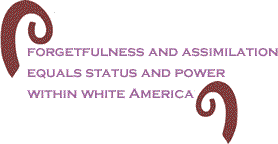 |
||||
�For the first time in my adult life, I am really proud of my country because it feels like hope is finally making a comeback,� said Michelle Obama in March 2008. See. See. She�s a militant! She remembers! In the same month, journalist Evan Thomas, in �Alienated
in the
Thomas notes Obama�s concern that she will �remain on the periphery of society: never becoming a full participant� even if she �assimilates.� Thomas continues: Obama�s thesis �surveyed 400
black Thomas: �Of course, the same happened to her when she entered the real world. Indeed, she somewhat reluctantly anticipates her fate in her thesis.� Perceptive? No, not really. Although I am aware that for many U.S. citizens it is normal, indeed, a display of civilized behavior on the part of a Black who ceases to identify with �blackness� and with the Black community, for others, including Black citizens, conscious of the necessity of white supremacy and capitalism to conquer and divide, the sacrifice of �blackness� is the dues one must pay to thrive in the belly of the beast.
Anything goes! Acquittals for the murdering of young Black men, bus loads of Black incarnated men and women, racists remarks in the media, racist remarks and acts, blatant, but cast in color-blind language, Black interests - high foreclosures, homelessness, high unemployment rates, inadequate health care, and poor quality education - dismissed in Reagan language of trick-down theory. And from within the Black community, the kicking is permissible! We owe the degeneration of the Black community to disaster capitalism, shock doctrine style destruction of our interests and goals - a disaster capitalism that demands the collaboration of the perpetrator and the oppressed to succeed in leaving as little as possible of the spirit, strength, courage, resistance, and focus it took to survive the middle passage and 400 years of slavery and subsequent years of disenfranchisement standing. We have as president and commander-in-chief the husband of Michelle Obama who says don�t return to the past, don�t remember. Last weekend, I listened to three Pacifica radio programs and watched one Book TV program on C-Span online featuring �Black history� or in a broad sense, U.S. history�s foundational yet marginal story of violence. It�s the kind of violence - not Black crime, if foundational and marginal - but the kind of violence that innocence indulges with eyes wide open. Each program featured an author and a book and
compelling narratives that warrant discussion. We, at the BC,
welcome your feedback. I have yet to read the books. Two of the
books were written when I had the misfortune of being Black while
living in Maybe. But we have something to remember. On a sylvan stretch of N Y�s Patricia upper
Of course, Dr. Sims became a success! The surgeries
he performed made him famous. He�s rewarded: the first president
of the Medical Association! A hero, as Dr. �Dr. Sims dedicated his career to the care and cure of women�s disorders and opened the nation�s first hospital for women in NYC�Hospitals still bear his name, including a west African hospital that utilizes the eponymous gynecological instruments that he first invented for surgeries upon black female slaves in the 1840s. Those Black women, our ancestors, who didn�t become heroes and don�t have monuments commemorating their sacrifices are kicked under the bus. But there�s the pattern of excising memory of injustice and oppression, crime and victims for that �great upward social mobility.� The narratives that Dr. Harriet A. Washington recounts are something to remember in pursuing reparations. But, is it possible for us to risk remembering? To remember isn�t only criminal but an illness. Jonathan Metzl is a white author. In a post-racial world, white writers and scholars have declared themselves equipped with the necessary perspective to critique and study Black culture and identity. Nothing new here: orientalism on the comeback - with a vengeance! Ever encounter white faculty in the halls of academia smile and wink as they talk with you about their courses in Black women�s history or literature or the study of Black critical thought while you and other Black faculty are relegated to courses that do not require your knowledge of race, gender, and class? So naturally, I was suspicious. Blackness that
becomes marketable, familiar, comfortable for white
Americans. Pathology. But as I watched Dr. Metzl�s presentation
on C-Span, I realized his work wouldn�t comfort white �Schizophrenia, said Dr. Metzl, is �a way of talking about race� without specifically referring to Black people. And it is not just any Black person diagnosed with schizophrenia. Recognized as a predominantly �white� disease until
the late 1950s, schizophrenia becomes associated with Black men
who by the 1960s and 1970s are diagnosed with the illness, Dr.
Metzl argues. What is happening in the
The Protest Psychosis: How Schizophrenia Became a Black Disease (Beacon, 2010), traces the collapse of rest home clinics for white women diagnosed with schizophrenia to the rise of correctional centers housed with Black men suffering from schizophrenia. While Dr. Metzl acknowledges the presence of biological appearance of schizophrenia in any population, he questions why and how this racially shift from one population to another coincidently developed during after the Civil Rights / Black Power movements. How do we, once a people who survived that Middle Passage, those 400 years of slavery and subsequent years of disenfranchisement and now - divided - ceasing to identify with ourselves, not recognize that we have been conquered. We have submitted, I would argue, to the healthy image, that is, the assimilated image of the Black who gleefully speaks of �we� interests, boss is threatened! What is life under tyranny? In Metzl�s audience is a man who knows! He stands to announce that Metzl is wrong. It�s not racism! He alluded to the bogeyman! If a Black policeman is called to scene and there�s this Black guy - well, the Black police better be prepared to deal with this Black guy! But is this Metzl�s argument? The one who knows has a theory. It�s sexism! White women and Black women are not present in these facilities of predominantly Black men diagnosed with schizophrenia. No women. Only Black men. Sexism! Anything! But be sure to kick-a-nigger out of the picture! The whole race of Black people is inherently insane! To remember isn�t only criminal but an illness! Linked to the War on Protest is the War on Drugs. In The New Jim Crow: Mass Incarceration in the Age of Colorblindness, (New Press, 2010), Michelle Alexander argues that the incarceration of Blacks and Browns is a practice of racial control. Since the War on Drugs began, in less than 30 years the prison population has increased from 300,000 to 2 million, said Dr. Alexander, interviewed by Sasha Lilley on Against the Grain (KPFA). �Drug convictions account for the majority of the increase.�
As Dr. Alexander explains, drug use was actually declining at the time Reagan declared a War on Drugs in 1982. �Crack cocaine [hadn�t become] an issue in poor Black communities.� But Republican politicians in the South listened to the concerns of poor and working class whites, worried about the job competition and, the laws of the land were adjusted to restore repressive measures against the Black population. In 1954, employment rates among Black youths 16-19 was higher than rates for white youths in the same age group. By 1984, with de-industrialization, globalization, and the War on Drugs, Black communities experienced �quadruple� rates of unemployment among Black youth, said Dr. Alexander. (1984 is after the Civil Rights era, after we sang �We Shall Overcome,� after this government declared Blacks free, again!). After 1984 and continuing now in 2010, Black communities find themselves in a situation in which they have �no control.� Low-income Black men found themselves �disposable� and �hauled off to prison� In time, huge segments of the Black community became �politically disenfranchised,� said Dr. Alexander. Can�t find a Black juror? See the big picture: The War on Protest diagnosed freedom as the illness and collected bodies to sedate while it devised the death machine COINTELPRO, and poor and working class Blacks move in and out of prison and correctional facilities as a result of the War on Drugs.
But, it�s all so colorblind now. Explicit hatred and anger against Blacks is in! Kick-a-nigger and then claim he or she did it to themselves! Proud of We were not perfect, but we used to honor those who endured the brutality and sacrificed their lives so that we may live. I don�t think they intended for us to live in imitation of the larger society - by standing on the backs of our own people. Even as they risked everything to reach freedom, African Americans once secret anguish of literacy emerged as both public demand and support for education. Their determination to acquire literacy and numeracy generated the energy to build schoolhouses even while they tackled the physical challenges of hunger, disease, and homelessness. Heather Andrea Williams�s Self-Taught:
African American Education in Slavery and Freedom published
by the A professor of history, Williams said that her book is �relevant in our contemporary moment when so many of us are concerned about the quality of education that children receive in schools as well as the level of engagement of these children in the educational process.� In her talk, Dr. Williams referred to those Black children forced to adopt an oppositional stand in school as they feel they not welcomed or don�t belong. These children, she continues, come to believe that �their ways of being, of behaving, of speaking is substandard.� These children practice �rejecting before being rejected,� and consequently, their oppositional stand �further distances them from teachers.�
What have we been made to forget and why? The recently freed Blacks, among other things, wanted to read the Bible so they could discover whether or not Black really had to submit as servants to their masters. Today, some of us read the Bible to empower us as individuals, distinguishing, with the voice of authority, the damned from the blessed. The Past? Some of us read the Jewish history of the Exodus to the stubborn exclusion of reading David Walker's Appeal or Frantz Fanon�s The Wretched of the Earth. We had the printing presses cranking out papers. Today, we watch Fox News and CNN reports on Black criminality. What have we been made to forget and why? Any why are we not willing to engage the question but submit willingly as servants to masters? Some of us think we are past the question and others assume the role of the servant to �get ahead.� Some day in the future, things will, on their on accord, work themselves out. Dr. Williams addresses the �status of exceptionalism� - noting that those who achieve academia status are questioned by whites who want to know �what makes us so different�? The status of exceptionalism allows whites to maintain their belief about the inferiority of the masses of Blacks while acknowledging the �exception.� Although
she begins her courses in history with the study of ancient Africans,
Dr. Williams said she encourages her students to imagine the courage
of ordinary people in slavery in the Servants in capitalism - that�s the only comeback of business as usual that really never disappeared. Slavery is the economic bases within the prison industry. Neo-slavery is what some of us call work in the White House, Congress, educational institutions, or the factories regardless of our �educational� achievement or �financial� status.� We�ve come a long way from those kick-a-nigger days of Jim Crow, and the Empire with its corporate rulers has stayed one step ahead of our �getting ahead� to alienate the servants from the insane. But we who believe in freedom� As Dr. Heather Andrea Williams reminds us, our past is the struggle to survive brutality but also our past represents the �resilient and creative and hopeful,� she said, �because these are the characteristics that are essential for survival.� BlackCommentator.com
Editorial Board member, Lenore Jean Daniels, PhD, has been a writer
for over thirty years of commentary, resistance criticism and
cultural theory, and short stories with a Marxist sensibility
to the impact of cultural narrative violence and its antithesis,
resistance narratives. With entrenched dedication to justice and
equality, she has served as a coordinator of student and community
resistance projects that encourage the Black Feminist idea of
an equalitarian community and facilitator of student-teacher communities
behind the walls of academia for the last twenty years. Dr. Daniels
holds a PhD in Modern American Literatures, with a specialty in
Cultural Theory (race, gender, class narratives) from |
||||
 |
||||
If you would like to comment on this article, please do so below. There is a 400 character limit. You do not need a FaceBook account. Your comment will be posted here on BC instantly. Thanks. Entering your email address is not mandatory. You may also choose to enter only your first name and your location.
|
||||
Thank you very much for your readership. |
||||
| Any BlackCommentator.com article may be re-printed so long as it is re-printed in its entirety and full credit given to the author and www.BlackCommentator.com. If the re-print is on the Internet we additionally request a link back to the original piece on our Website. | ||||
| |
||||
Issue 364 |
| Executive Editor: Bill Fletcher, Jr. |
| Managing Editor: Nancy Littlefield |
| Publisher: Peter Gamble |
| Est. April 5, 2002 |
| Printer Friendly Version in resizeable plain text format |
 |
 |
 |

|
 |
| |
| |
































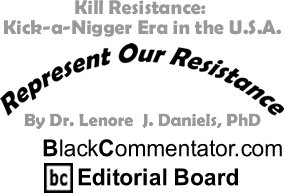
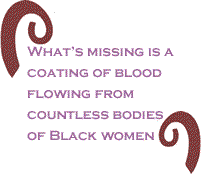 Michelle
Obama had to toss aside her memory of blackness for the equation:
forgetfulness and assimilation equals status and power within
white
Michelle
Obama had to toss aside her memory of blackness for the equation:
forgetfulness and assimilation equals status and power within
white  The
image of the benevolent �father of gynecology� begins Harriet
A. Washington�s
The
image of the benevolent �father of gynecology� begins Harriet
A. Washington�s 
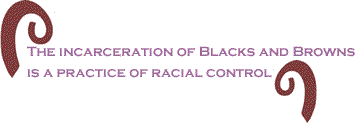 �People
[who] felt they were going to change the society, ordinary people,�
were considered crazy. Dr. Metzl suggests that the shift
and categorization of Black protest is an �issue of capitalism,�
because Black protest, demanding freedom is recognized as a threat
to capitalism and the dominance of one race in the
�People
[who] felt they were going to change the society, ordinary people,�
were considered crazy. Dr. Metzl suggests that the shift
and categorization of Black protest is an �issue of capitalism,�
because Black protest, demanding freedom is recognized as a threat
to capitalism and the dominance of one race in the 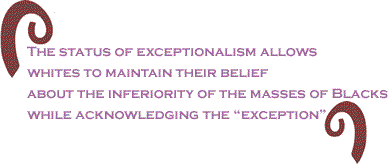
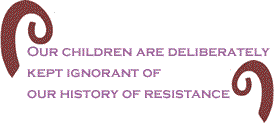 Yet,
I am reminded that Michelle Obama, too, felt she didn�t belong
at
Yet,
I am reminded that Michelle Obama, too, felt she didn�t belong
at 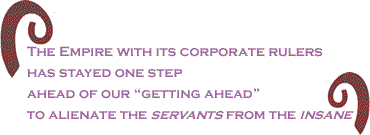 Our
ancestors who lived despite the effort of the masters to kill
them, those who fought between water holes and bullets, are witnessing
our Black women writers speaking softly and daintily about gardening
and the �good ol� days� of the Movement. What Black child will
contribute to the history of the history of the Nubian? Or what
Black child will chronicle the degradation of the workers, the
poor, and the oppressed in this 21st century?
Our
ancestors who lived despite the effort of the masters to kill
them, those who fought between water holes and bullets, are witnessing
our Black women writers speaking softly and daintily about gardening
and the �good ol� days� of the Movement. What Black child will
contribute to the history of the history of the Nubian? Or what
Black child will chronicle the degradation of the workers, the
poor, and the oppressed in this 21st century?








